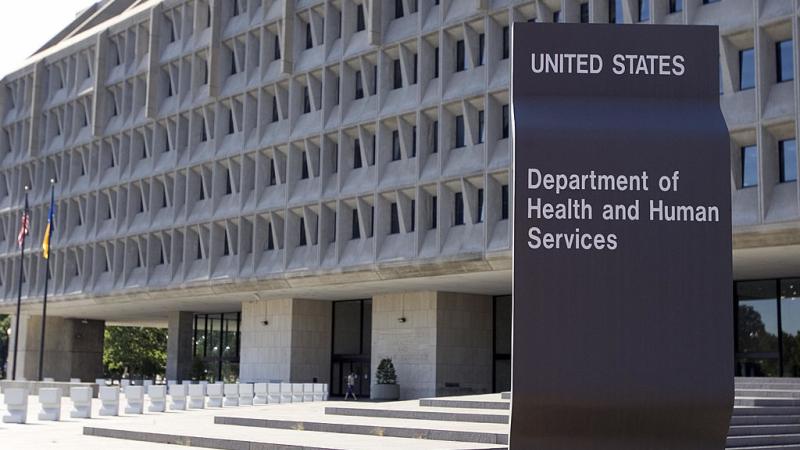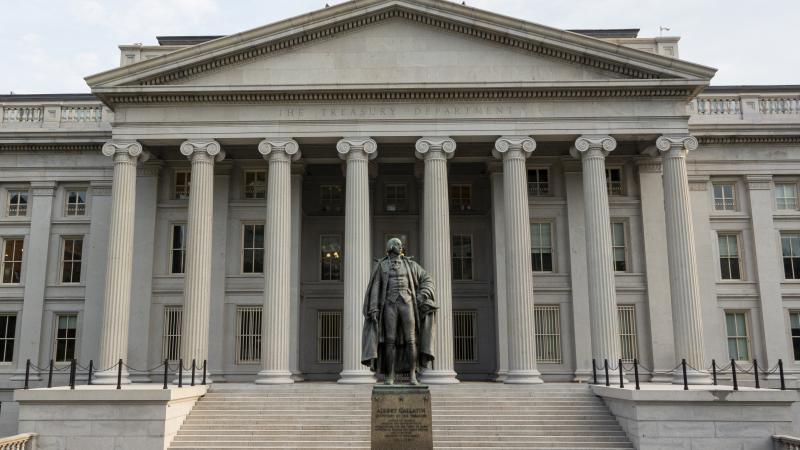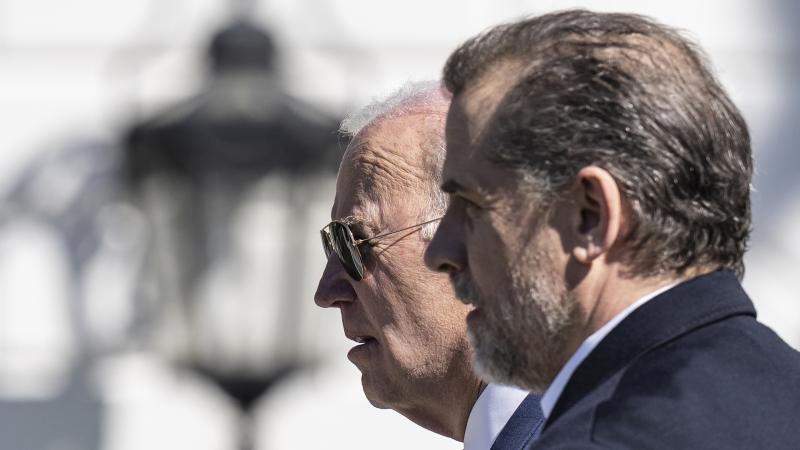FBI agent Elvis Chan removed from post after linked to Hunter Biden laptop censorship, sources say
Sources tell Just the News that FBI agent Elvis Chan has been removed from his key post involved in cyber efforts and interactions with social media companies after he was linked to efforts to censor Hunter Biden laptop stories.
A key FBI official involved in the bureau’s cyber efforts who was linked to censorship of the Hunter Biden laptop and to the FBI’s purported anti-disinformation efforts has been removed from his post, sources told Just the News.
Elvis Chan, who is still listed on his LinkedIn as the assistant special agent in charge of the cyber branch for the San Francisco division of the FBI, has been the subject of congressional Republican efforts to get to the bottom of the role the bureau played in decisions by social media companies to censor New York Post stories on the laptop hard drive belonging to President Joe Biden’s son in October 2020.
Sources familiar with the situation told Just the News that Chan, who previously defied a congressional subpoena to testify about his role in the FBI’s social media censorship activities, has been removed from his FBI post in San Francisco. The FBI declined to comment.
It was reported by the Independent Newsroom on Thursday that Chan “has been placed on ‘terminal leave’ and has not accessed his agency devices for over a month.”
In October 2020, shortly before the presidential election, the New York Post released stories detailing Hunter Biden’s questionable business dealings in China and Ukraine.
When the publication attempted to post the articles on its Twitter account, the social media company said doing so violated its rule against sharing “hacked” materials. Facebook also limited the dissemination.
House Judiciary Committee Chairman Jim Jordan (R-Ohio) issued a September 2023 subpoena to Chan after the Biden-led Justice Department blocked Chan's appearance at a voluntary interview.
"As the primary liaison between the Federal Bureau of Investigation’s Foreign Influence Task Force (FITF) and social media companies, you are uniquely positioned to aid the Committee’s oversight,” Jordan told Chan.
Chan and FITF Section Chief Laura Dehmlow met with Facebook on Oct. 14, 2020 – the day the New York Post published its story about the laptop. Dehmlow met with both Twitter, now X, and Facebook that day.
IRS whistle-blowers also previously revealed that the FBI had verified the authenticity of the laptop by November 2019 – nearly a year before its existence was made public emerged and a group of 51 former senior intelligence officials released an open letter stating that the laptop "has all the classic earmarks of a Russian information operation."
(It was later revealed that former acting CIA Director Michael Morell wrote the laptop letter after being “prompted” by a 2020 Biden campaign staffer and future Secretary of State Antony Blinken to do so, and that the debunked laptop letter was written to give Joe Biden a “talking point” in his debate with Trump ahead of the Election Day 2020.)
Documents published by Jordan show that when a Twitter representative asked whether the laptop was real, an FBI agent said "yes," but an FBI lawyer jumped in, cutting him off with, "No further comment."
House Republicans revealed that Dehmlow then said the FBI held emergency deliberations on how to respond to the question going forward. When the Facebook meeting was held later in the day, the FBI simply said "no comment" when asked whether the Hunter Biden story was factual. Chan himself argued that “at the time we had not confirmed that the FBI was actually investigating Hunter Biden. So she did not have the authority to say anything or to comment about it.”
The Judiciary Committee argued in 2024 that “the FBI made this decision despite possessing the laptop and having determined that it was authentic and, thus, not the product of Russian propaganda.”
The GOP-led committee filed a February 2024 lawsuit seeking to compel Chan’s testimony, telling the court it "intends to ask Chan about this decision, including if the FBI considered whether and how its answer would affect the way the technology companies treated the New York Post story, especially in light of its prior warnings to the companies about Russia.”
The committee told the court that Chan had “violated his legal duty to comply with the Committee’s lawfully issued Subpoena, and his defiance is obstructing the Committee’s investigation.”
Chan’s LinkedIn indicates that he has been with the FBI since 2005. He was a supervisory special agent with the “San Francisco Division/National Security Cyber Squad” from September 2014 to December 2020 – the timeframe including the laptop censorship saga. He was then made the assistant special agent in charge of the “San Francisco Division/Cyber Branch” from January 2021 until the “present.”
“I lead a team of dedicated cybersecurity professionals who are deeply committed to protecting the American people and upholding the Constitution of the United States,” Chan’s LinkedIn says.
The day after Twitter blocked the New York Post’s stories, then-Twitter CEO Jack Dorsey tweeted: “Straight blocking of URLs was wrong, and we updated our policy and enforcement to fix.”
Dorsey testified before the Senate in November 2020 after Joe Biden defeated Trump in the November 2020 presidential election.
“We made a quick interpretation, using no other evidence, that the materials in the article were obtained through hacking, and according to our policy, we blocked them from being spread,” Dorsey said. “Upon further consideration, we admitted this action was wrong.”
Facebook founder Mark Zuckerberg has suggested his platform blocked the stories as disinformation at the urging of the FBI.
Chan graduated from the Naval Postgraduate School in 2021, where he wrote a thesis titled, “'Fighting Bears and Trolls': Russian Disinformation against the 2020 Elections and the Social Media Companies and U.S. Government Countermeasures.” Chan’s thesis is 125 pages long, and makes no mention of the Hunter Biden saga.
Chan’s 2022 testimony in a freedom of speech case confirmed that the bureau ran an operation during the 2020 election that requested social media companies remove content as disinformation, suggesting the government’s requests succeeded about half of the time and were conducted with a "headquarter stamp of approval."
Asked how frequently his unit succeeded in getting posts blocked, Chan testified: "I would not say it was a 100 percent success rate. If I had to characterize it, I would say it was like a 50 percent success rate. But that's just from my recollection."
Chan, in his deposition for the lawsuit brought by Missouri Attorney General Eric Schmitt and Louisiana Attorney General Jeff Landry, said his unit did not direct Twitter and Facebook to block the New York Post and that the Hunter Biden issue was never raised in government meetings he attended with officials from Homeland Security's Cybersecurity and Infrastructure Security Agency (CISA) and the social platforms.
Hunter Biden came up only one time when a Facebook executive asked whether the FBI had a probe of the future president's son and agents declined to answer the question, he said.
"Hunter Biden was not – in my recollection, Hunter Biden was not referred to in any of the CISA USG-industry meetings," Chan testified.
"From my recollection, one meeting with Facebook after the regular agenda had been completed, one of the Facebook analysts asked if the FBI had any information they could share about the Hunter Biden investigation," Chan also said. "To that I recall [FBI official] Ms. Laura Dehmlow saying that the FBI had no comment."
Chan testified in the freedom of speech case that he “was confident that [he] was not a party to any meeting with social media companies where Hunter Biden was discussed outside of the [Facebook-FITF bilateral meeting]” and that he had “no internal knowledge of [the Hunter Biden] investigation.”
A House Republican report from last year said that Chan’s testimony was “contradicted” by an FBI analyst who told congressional investigators that he messaged Chan and “mentioned that there was an ongoing investigation” on the morning of October 14, 2020.
Jordan previously published an internal Facebook document showing that Chan had a "follow up" call with the social media platform on Oct. 15, 2020 – one day after the initial meeting.
A Facebook employee who is a former FBI agent wrote on Oct. 15, 2020, that "Chan advised that he was up to speed on the current state of the matter within the FBI," according to messages published by Jordan.
Chan figured prominently in that October 2024 report by the GOP-led Committee on the Judiciary and the Select Subcommittee on the Weaponization of the Federal Government that was titled, “Election Interference: How the FBI ‘Prebunked’ a True Story about the Biden Family’s Corruption in Advance of the 2020 Presidential Election.”
The GOP report said that “the roots of the FBI’s 2020 prebunking scheme date back to the 2016 presidential election, after which emerged sensationalized accounts that foreign ‘disinformation’ had affected the integrity of the election” and that “fueled by left-wing election denialism, a cottage industry of pseudoscientists, think tanks, and university centers sprung up to combat the alleged rise in misinformation and disinformation, which they held responsible for President Trump’s victory.”
The FBI “formed the Foreign Influence Task Force to coordinate with social media companies and prevent alleged foreign disinformation from reaching American voters,” the Republican report argued, adding that “these entities worked together and with social media companies to censor speech—disproportionately conservative speech—all in the name of stopping disinformation and, ironically enough, promoting democracy.”
The GOP report said that “FBI agents—typically Elvis Chan, Assistant Special Agent in Charge of the FBI’s San Francisco Field Office—scheduled FITF bilateral meetings with social media companies quarterly, with additional calls or meetings on an ad hoc basis.”
Chan “confirmed that in bilateral meetings, the FBI discussed platforms’ policies regarding hacked materials and how the policies might apply to potential foreign influence operations,” the Republican report said.
Attorney General Pam Bondi announced in February that “the Foreign Influence Task Force shall be disbanded” in order to “free resources to address more pressing priorities and end risks of further weaponization and abuses of prosecutorial discretion.”
Chan told lawyers for the Missouri and Louisiana attorneys general in a lawsuit over social media censorship that he supervised a "command post" in his home city that helped the nationwide disinformation censorship operation function in fall 2020.
He described a sprawling operation that enlisted the help of FBI field offices around the country, federal prosecutors, and FBI and Justice Department lawyers before his unit would make the final request to social media to block content deemed by the operation to be disinformation or in violation of each company’s term of service.
“Social-media platforms updated their policies in 2020 to provide that posting ‘hacked materials’ would violate their policies. According to Chan, the impetus for these changes was the repeated concern about a 2016-style ‘hack-and-leak’ operation,” Judge Terry Doughty of the U.S. District Court for the Western District of Louisiana said in a July 2023 ruling. “Although Chan denies that the FBI urged the social-media platforms to change their policies on hacked material, Chan did admit that the FBI repeatedly asked the social-media companies whether they had changed their policies with regard to hacked materials because the FBI wanted to know what the companies would do if they received such materials.”
The judge wrote that “most of the time, the emails flagging the misinformation would go to seven social-media platforms. During 2020, Chan estimated he sent out these emails from one to six times per month. … When the FBI sent these emails, it would request that the social-media platforms report back on the specific actions taken as to these indicators and would also follow up at the quarterly meetings.”
The 5th Circuit Court of Appeals in September 2023 upheld the lower court decision in Missouri v. Biden barring the federal government from working with social media companies to remove First Amendment-protected content.
Yoel Roth, who at the time led Twitter's trust and safety department, said in a December 2020 declaration to the Federal Election Commission that he was head of site integrity at Twitter, which is part of Twitter’s Trust and Safety Department.
“Since 2018, I have had regular meetings with the Office of the Director of National Intelligence, the Department of Homeland Security, the FBI, and industry peers regarding election security,” Roth said. “During these weekly meetings, the federal law enforcement agencies communicated that they expected ‘hack-and-leak operations’ by state actors might occur in the period shortly before the 2020 presidential election, likely in October.”
He also said his team “determined that the information in the articles could have been obtained through hacking” and that his team “escalated” the articles for further review. Roth said Twitter’s Trust and Safety leadership then determined the articles “violated the Distribution of Hacked Materials Policy,” and the leadership group “instructed the Site Integrity Team to execute enforcement.”
In addition, Roth said his team then blocked Twitter users from sharing links to the New York Post articles. He said he did not discuss it with any Biden campaign representatives prior to censoring the articles.
Roth also testified in February 2023 that “Twitter and other tech companies worked to build closer information-sharing relationships with law enforcement such as the FBI” in the lead up to the 2020 election to deal with alleged “threats” posed by Russian disinformation efforts similar to those in 2016.
An October 2020 complaint from the RNC alleged that “through its ad hoc, partisan oppression of media critical of Biden, [Twitter] is making illegal, corporate in-kind contributions as it provides unheard-of media services for Joe Biden’s campaign.” The FEC rejected the complaint in August 2021.
An FBI webpage – titled “Get to Know FBI Cyber: Elvis Chan” – features an interview with the controversial bureau figure.
“Most of my day is spent sharing information, coordinating activities, or devising strategies and plans to stop bad guys,” Chan said. “I think the FBI and the private sector will be working even more closely together than they do now. We collaborate on an ad hoc basis for security incidents, but I believe this will become more systemic as we continue to build trust with each other and realize the benefits of these partnerships.”
Independent investigative journalist Catherine Herridge tweeted in early April that “for the first time, and with a change of administration, the FBI has now turned over to GOP House investigators the internal chat messages that show Bureau leadership actively silenced its employees.”
In the chat messages, an individual whose name was redacted messaged Chan that there was a “gag order” on discussion of Hunter Biden’s laptop.
Chan asked in the chat, “actually what kind of case is the laptop thing? corruption? campaign financing?” Another FBI employee responded, “CLOSE HOLD –” with the rest of the response redacted. Chan responded, “oh crap … ok. It ends here.”
Chan was also asked in the chat whether “Anyone discussing that NYPost article on the Biden’s?” Chan responded, “yes we are. c d confirmed an active investigation. No further comment.” It is likely that “C D” referred to the FBI’s Criminal Division.
Sens. Chuck Grassley (R-Iowa) and Ron Johnson (R-Wisc.) sent a letter to FBI Director Kash Patel last month in response to the new report.
“These October 2020 internal messages appear to corroborate whistle-blower information that we previously released highlighting the FBI’s widespread efforts to downplay and undermine investigatory steps relating to Hunter Biden and not just the laptop,” they wrote.
The senators pointed to a July 2022 letter Grassley wrote about whistle-blower disclosures indicating that, in August 2020, “there was a scheme in place among certain FBI officials to undermine derogatory information connected to Hunter Biden by falsely suggesting it was disinformation.”
The GOP senators also told Patel that in August 2020 they were "provided an unnecessary briefing by the FBI’s Foreign Influence Task Force that was designed to undermine our investigation into the Biden family.”
The letter from the senators also said that, in August 2022, Johnson learned from whistle-blowers that after the FBI obtained the laptop in late 2019, local FBI leadership told employees, “You will not look at that Hunter Biden laptop.”
Grassley and Johnson asked Patel to hand over all “chat messages” referenced in Herridge’s report and “all text messages, instant messages, team chats, and all other ‘chat messages’ referring or relating to the Hunter Biden laptop, sent between and among” a number of FBI employees – including Chan.
The Facts Inside Our Reporter's Notebook
Links
- reported
- September 2023 subpoena
- met with Facebook
- published by Jordan
- lawsuit seeking to compel
- told the court
- tweeted
- Dorsey said.
- suggested
- ex-spies arguing
- wrote a thesis
- testimony
- published an internal Facebook document
- wrote
- figured prominently
- announced
- supervised a "command post"
- July 2023 ruling.
- upheld the lower court decision
- declaration
- testified
- complaint from the RNC
- rejected the complaint
- âGet to Know FBI Cyber: Elvis Chanâ
- tweeted
- sent a letter
- July 2022 letter
- provided an unnecessary briefing
- told












